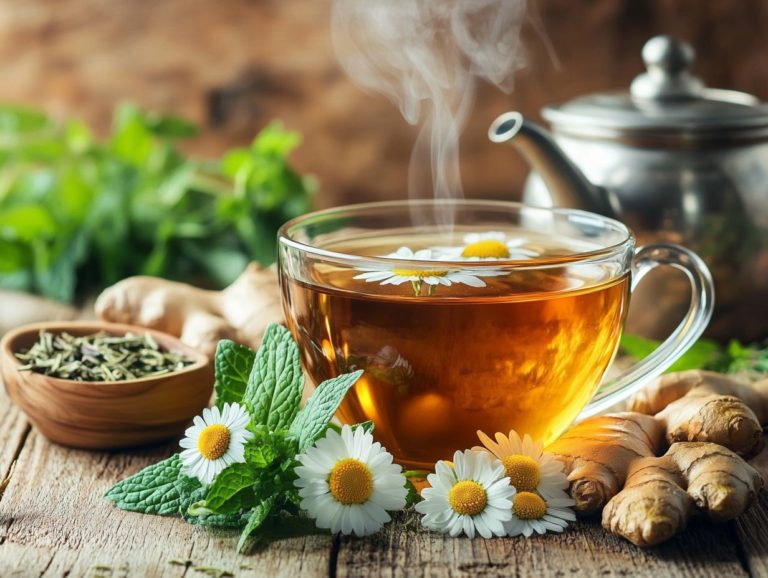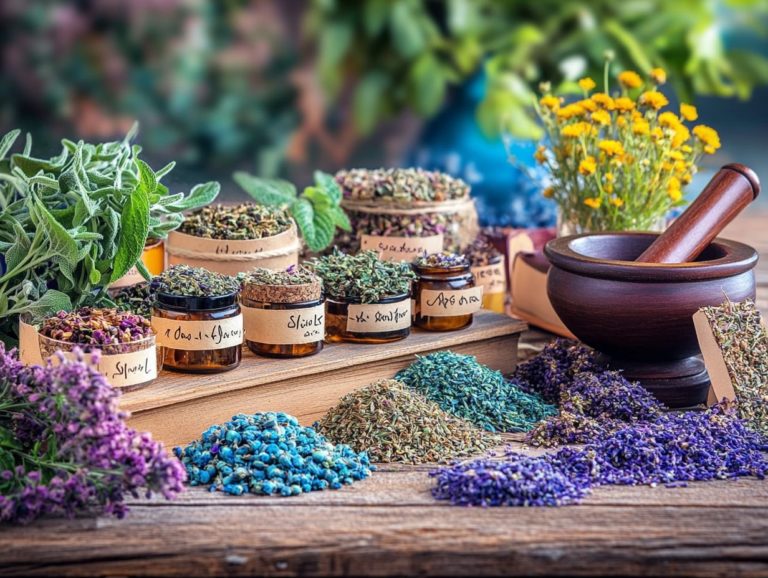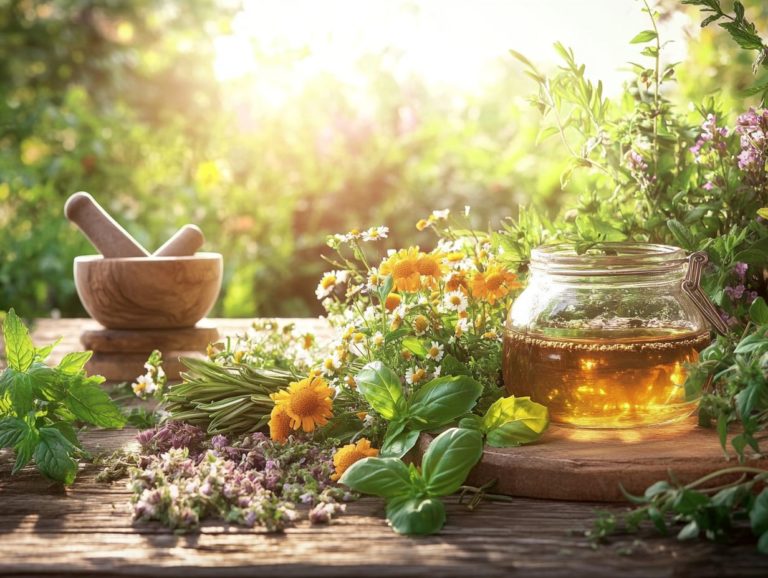Top 10 Herbs for Boosting Immunity
In today’s fast-paced world, maintaining a robust immune system is paramount. While you already know that a balanced diet and regular exercise are critical, let s explore the top 10 herbs that can boost your immune system. Adding certain herbs can offer you an extra layer of protection.
You’ll also find insights on how to incorporate these herbs into your daily routine, potential side effects to be aware of, and answers to common questions about their use. Get ready to discover exciting natural ways to supercharge your health today!
Contents
- Key Takeaways:
- 1. Garlic
- 2. Echinacea
- 3. Elderberry
- 4. Astragalus
- 5. Turmeric
- 6. Ginger
- 7. Ginseng
- 8. Oregano
- 9. Green Tea
- 10. Licorice Root
- What Are the Benefits of Using Herbs for Boosting Immunity?
- How Do These Herbs Help in Boosting Immunity?
- What Are the Different Forms of These Herbs and How to Use Them?
- What Are the Possible Side Effects of Using These Herbs?
- How Can One Incorporate These Herbs into Their Daily Routine?
- Are There Any Precautions to Take When Using These Herbs?
- Can These Herbs Replace Traditional Medicines for Boosting Immunity?
- What Are Some Other Natural Ways to Boost Immunity?
- Are There Any Herbs That Should Be Avoided for Boosting Immunity?
- What Are Some Common Myths About Using Herbs for Boosting Immunity?
- Frequently Asked Questions
- What are the top 10 herbs for boosting immunity?
- How do these herbs help boost immunity?
- Can these herbs be used in combination with each other?
- Can these herbs be used as a preventive measure against illnesses?
- Are there any side effects of using these herbs?
- How can these herbs be consumed?
Key Takeaways:
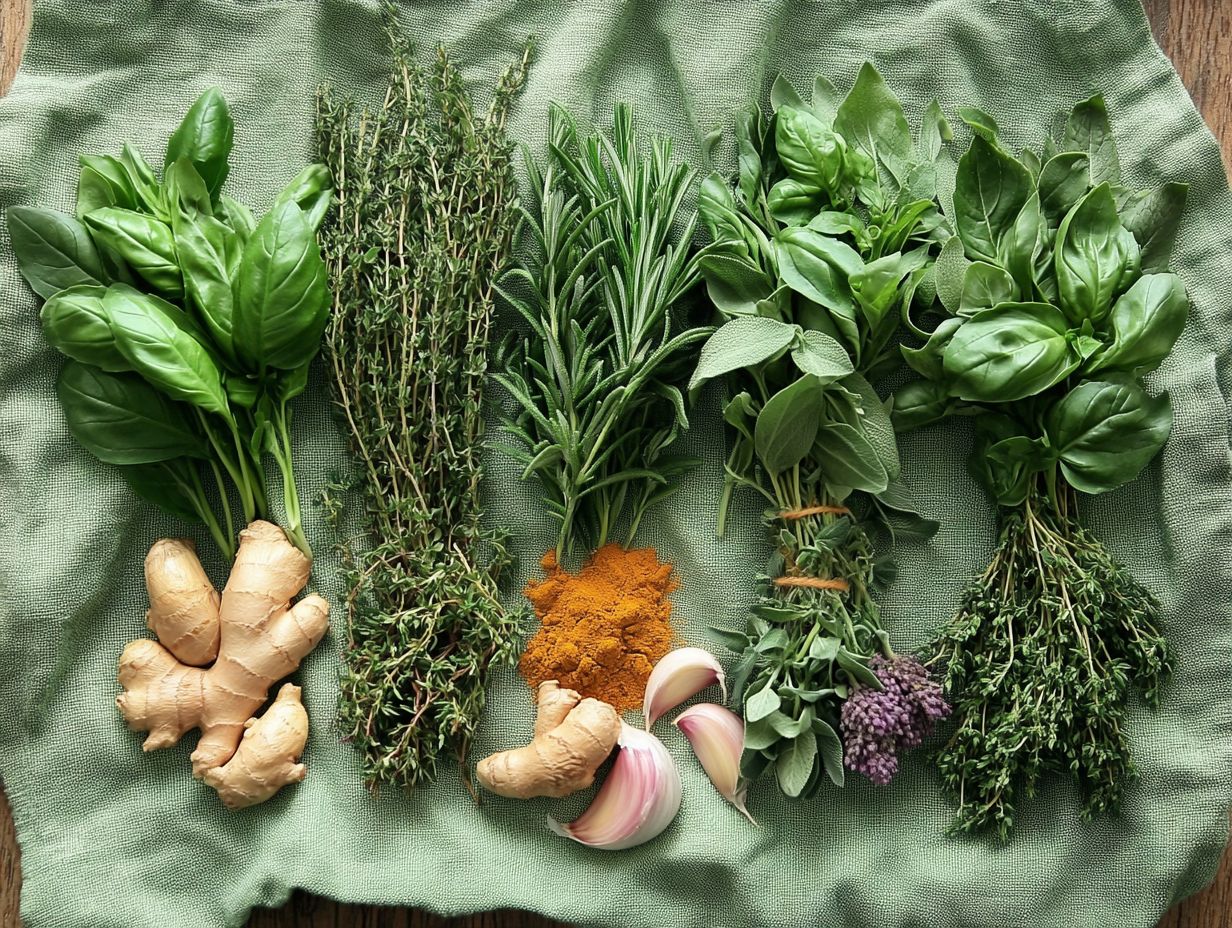
Boost your immunity with natural herbs like garlic, echinacea, elderberry, astragalus, turmeric, ginger, ginseng, oregano, green tea, and licorice root. These herbs help support your body’s natural defense system and fight off harmful viruses and bacteria.
Incorporate these herbs into your daily routine through supplements, teas, tinctures, or by adding them to your meals. Consult with a healthcare professional to avoid potential side effects or interactions with other medications.
1. Garlic
Garlic is your go-to herb, known for boosting immune health. It s been a cornerstone of traditional medicine for centuries.
Garlic is rich in antioxidants. It strengthens your immune system and acts as a natural shield against infections.
The magic ingredient behind these remarkable benefits is allicin, which is unleashed when you chop or crush garlic. This active compound boasts antimicrobial and anti-inflammatory properties, giving your immune response an extra boost.
To reap the health benefits of garlic, you can easily weave it into your meals by adding it to:
- Salads
- Sauces
- Roasted dishes
For those seeking maximum potency, consuming raw cloves is an option as well. However, be mindful that overindulgence can lead to gastrointestinal discomfort or allergic reactions in some individuals.
Garlic s significance in herbal remedies is often emphasized in holistic practices, making it a versatile addition to any wellness routine you wish to adopt.
2. Echinacea
Echinacea is a remarkable herb celebrated for its ability to fend off infections and bolster immune health, often featured in traditional herbal remedies.
You may have heard about its potential to shorten the duration of colds and flu, effectively supporting your body’s natural defense mechanisms. Among the various species of echinacea, Echinacea purpurea is the most popular for its immune-boosting benefits.
Each species, including Echinacea angustifolia and Echinacea pallida, offers unique attributes that contribute to your overall health. These varieties are rich in beneficial compounds like alkamides, polysaccharides, and flavonoids, which work to stimulate white blood cell activity and enhance your body s resilience against infections.
You ll find echinacea in several popular forms, including teas, capsules, and tinctures, providing options to suit your preferences. If you have allergies to plants in the Asteraceae family, proceed with caution.
Consulting with a healthcare provider before incorporating any new supplement into your routine is always a smart move, ensuring it aligns well with any existing health conditions.
3. Elderberry
Elderberry, a true natural powerhouse, is celebrated for its immune-boosting properties, making it a favored choice in herbal remedies.
Brimming with antioxidants, elderberry is particularly adept at combating viral infections, thereby playing a crucial role in maintaining your overall health and immune function.
Among the many varieties of elderberry, Black Elderberry stands out with its remarkably rich nutrient profile and therapeutic benefits. This versatile berry offers a range of consumption options; you can brew it into a soothing tea, create delightful syrups or jams, or even take it in supplement form.
Research suggests that Black Elderberry may help reduce the severity and duration of illnesses like the flu by inhibiting viral replication. While it s generally safe, it s essential to remember that consuming raw elderberries or other parts of the plant can lead to nausea or gastrointestinal discomfort, underscoring the importance of using properly prepared products.
4. Astragalus
Astragalus, a cornerstone of traditional Chinese medicine, is renowned for its ability to bolster immune function and enhance your body s natural defenses against illness. This ancient herb elevates your immune system and promotes overall health and vitality through its remarkable adaptogenic properties, which help the body adapt to stress and promote balance.
It has also been used to fight tiredness, support cardiovascular health, and improve digestive function. Astragalus is packed with powerful antioxidants that shield your cells from damage while balancing inflammation in the body.
Thinking about adding this herb to your routine? It’s easy to find in tinctures, capsules, and powders. Recommended daily dosage: 500 to 1,000 mg. However, if you have autoimmune conditions or are taking immunosuppressants, consult a healthcare provider to avoid potential contraindications.
5. Turmeric
Turmeric, with its striking golden hue and impressive antioxidant properties, is essential for enhancing your immune response and maintaining overall health. The active compound curcumin in turmeric is celebrated for its anti-inflammatory and immune-boosting effects, making it a valuable addition to your herbal remedy toolkit.
Research indicates that curcumin can modulate various immune pathways, promoting a balanced response to potential threats while also soothing overactive inflammation.
To fully enjoy these benefits, you can effortlessly incorporate turmeric into your daily meals whether by blending it into smoothies, stirring it into soups, or sprinkling it on rice dishes. You might also consider brewing it in warm beverages like golden milk.
Be aware of possible side effects like gastrointestinal discomfort, particularly with excessive consumption. If you re taking blood thinners, antidiabetic medications, or acid-reducing drugs, consulting with a healthcare provider is wise to avoid any unwanted interactions.
6. Ginger
Ginger is truly a remarkable herb that has strong antiviral properties, significantly enhancing your immune function and contributing to overall health. Its warming effect aids digestion and helps your body fend off colds and infections, making it an essential component of any natural defense strategy.
Beyond its antiviral capabilities, ginger excels in reducing inflammation, often linked to chronic conditions. If you find yourself grappling with nausea, ginger can provide much-needed relief during pregnancy or chemotherapy.
Incorporating ginger into your daily meals is surprisingly simple. Finely grated ginger can add a delightful kick to your stir-fries, while a steaming cup of ginger tea offers a soothing option for relaxation.
Whether you choose fresh, dried, or powdered forms, there are countless creative ways to enjoy it from smoothies to baked goods. Just remember that moderation is key; excessive consumption could lead to stomach upset or heartburn, especially for those with sensitive digestive systems.
7. Ginseng
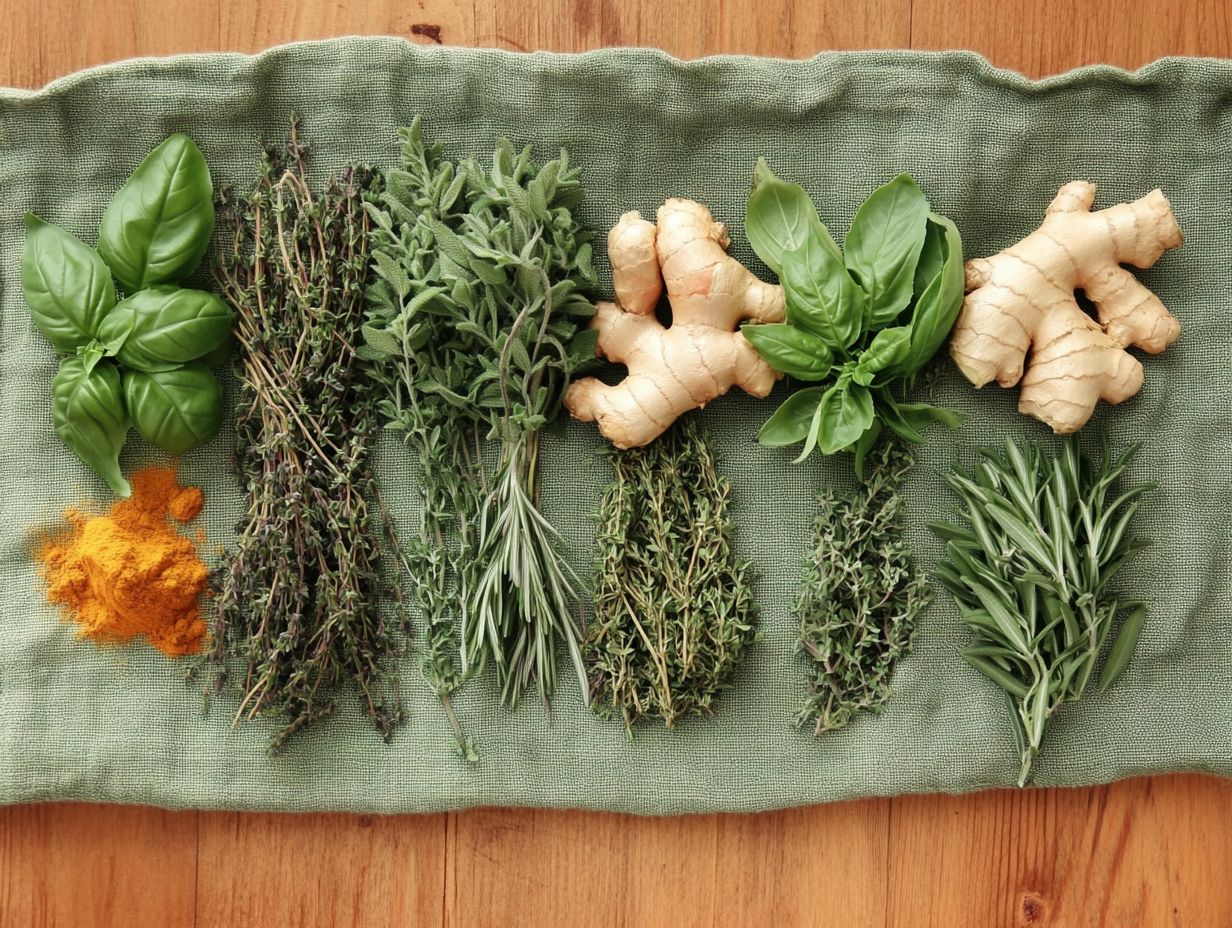
Right now, ginseng is trending in herbal remedies! This ancient herb is cherished in traditional healing practices and possesses remarkable effects on immune health. It supports immune function during stressful times and enhances your body’s resilience against infections.
Among the various types of ginseng, Panax ginseng often referred to as Korean ginseng stands out for its powerful aphrodisiac properties and ability to enhance cognitive function.
American ginseng is celebrated for its cooling effects, making it a popular choice for those dealing with heat-related conditions. Siberian ginseng isn t a true ginseng, but it offers unique benefits that help boost endurance and cope with stress.
You ll find ginseng in supplements, teas, and energy drinks, with recommended daily dosage: 200 to 400 mg, depending on the specific type. Just be mindful excessive use can lead to potential side effects like insomnia, digestive issues, and elevated blood pressure.
8. Oregano
Oregano is a flavorful powerhouse for your health! It’s more than just a tasty addition to your dishes; it’s a powerful herb that boosts your immune function with its rich antioxidants.
Renowned for its antimicrobial properties, oregano helps your body fend off pathogens, supporting overall immune health. One standout compound in oregano, carvacrol, has impressive antibacterial and antiviral capabilities.
The oils extracted from oregano can be potent essential oils, ideal for aromatherapy or topical applications. The dried herb can also be steeped into delicious teas that soothe digestive issues and reinforce your immune system.
Its culinary uses are incredibly versatile. By adding oregano to sauces, marinades, or roasted vegetables, you not only elevate the flavor but enrich your meals with nutrients that promote wellness.
In this way, oregano emerges as a holistic ally in your kitchen and health regimen.
9. Green Tea
Green tea stands out for its impressive antioxidant content, vital for boosting your immune function and enhancing overall health. Packed with catechins, this drink elevates your body’s natural defenses, making it a favored choice for anyone looking to improve their immune health.
This drink also offers many health benefits, such as aiding in weight management by revving up your metabolism and promoting fat burning. Additionally, it supports heart health by lowering bad cholesterol levels and enhancing blood circulation, reducing the risk of cardiovascular diseases.
To truly enjoy these benefits, brew your green tea at warm to hot temperatures around 160 to 180 F for just 2 to 3 minutes. This prevents bitterness and preserves the delicate compounds that make green tea special.
While generally safe, be mindful that too much can lead to mild side effects like stomach upset or insomnia, so moderation is key to achieving optimal results.
10. Licorice Root
Licorice root is celebrated for its delightful sweetness and impressive medicinal properties. This powerful herb bolsters your immune function and has been used for centuries to fortify the body s defenses, making it an essential part of your herbal toolkit.
The active compounds in licorice root, especially glycyrrhizin and flavonoids, are crucial to its health benefits. Glycyrrhizin has anti-inflammatory properties and may help alleviate respiratory issues.
Herbalists integrate this versatile herb into teas, tinctures, and capsules, making it a convenient addition to your wellness routine.
However, use licorice root with caution, especially regarding long-term consumption. Extended use may lead to complications like high blood pressure or potassium depletion. Therefore, consulting a healthcare professional before starting any regimen is essential.
What Are the Benefits of Using Herbs for Boosting Immunity?
Using herbs to boost your immunity offers many benefits, including enhanced immune function, reduced risk of infections, and overall health improvement.
Herbal remedies harness nature’s power to fortify your immune system, delivering essential nutrients and antioxidants that modern diets often lack. These natural solutions work well together; combining various herbs can amplify their protective effects.
For example, pairing echinacea with elderberry enhances their properties and creates a strong defense against pathogens. The rich antioxidants in herbs like garlic and ginger play a vital role in neutralizing harmful free radicals that can undermine your immune response.
Incorporating these herbal allies into your routine today can supercharge your immune system, offering a holistic approach to enhance your health and resilience.
How Do These Herbs Help in Boosting Immunity?
These herbs are your allies in boosting immunity through impressive mechanisms. They enhance immune function, provide antioxidants, and promote overall well-being. Add these herbal remedies to your daily routine to support your immune health and fortify your body against illnesses.
Take echinacea, for instance. Studies show it stimulates the production of white blood cells, which are crucial for fighting infections.
Garlic is renowned for its antimicrobial properties. It contains a natural compound that helps boost your immune system and acts as an antioxidant, neutralizing free radicals in your body.
Elderberry is celebrated for reducing the duration and severity of cold and flu symptoms, making it a staple in traditional medicine.
When combined, these herbs create a powerhouse of immune support. Each offers unique strengths to bolster your defense system. By integrating these remedies into your daily regimen, you can achieve a synergistic effect that maximizes your health and resilience against pathogens.
What Are the Different Forms of These Herbs and How to Use Them?
Herbs can be consumed in various forms teas, tinctures, capsules, and powders. This flexibility allows you to choose according to your preferences. Understanding these different forms is crucial for unlocking their full potential.
Herbal teas are a favorite. Simply steep dried leaves in hot water for a soothing drink brimming with nutrients. Tinctures are concentrated liquid extractions made with alcohol, providing a potent dose of the active components of the herbs.
If you prefer precise measurements, capsules and powders offer easy customization of your intake based on specific health goals. In the kitchen, spices like oregano and garlic can be effortlessly incorporated into your dishes, elevating both flavor and health benefits.
Experimenting with various methods diversifies your herbal intake and keeps the experience engaging and enjoyable.
What Are the Possible Side Effects of Using These Herbs?
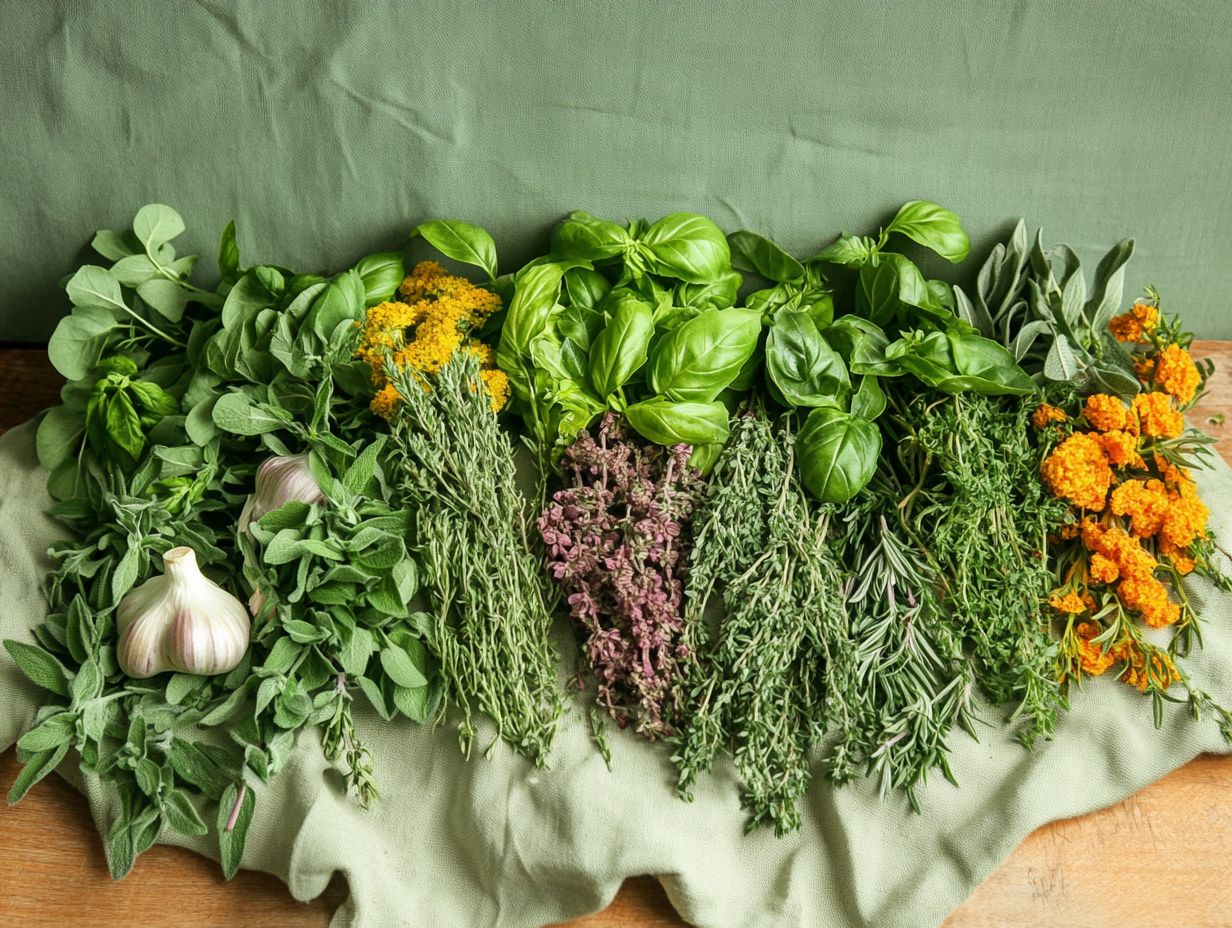
While herbs are generally regarded as safe, be mindful of potential side effects. These can differ based on the specific herb and your individual circumstances. Understanding possible side effects is vital for maintaining your immune function without compromising your health.
Echinacea may interact with immunosuppressants and can cause gastrointestinal upset for some. Garlic, celebrated for its immune-boosting properties, has blood-thinning effects, necessitating caution if you re on anticoagulants.
St. John’s Wort uplifts mood but can reduce the effectiveness of certain medications, including antidepressants and birth control pills.
To safely incorporate these herbs into your wellness regimen, consult with a healthcare provider, especially if you re taking prescription medications. This ensures you avoid harmful interactions and enjoy the benefits of herbs without worry.
How Can One Incorporate These Herbs into Their Daily Routine?
Incorporating these herbs into your daily routine can be simple and rewarding. There are myriad ways to enhance your immune function and overall health. Add herbs to your meals, teas, and supplements to seamlessly integrate these powerful allies into your lifestyle.
Herbs elevate the flavors of your dishes and offer a wealth of health benefits when used consistently. For instance, tossing fresh basil into your pasta or blending turmeric into your smoothie delights your taste buds while boosting wellness.
When brewing herbal teas, steep chamomile or ginger for a soothing drink that supports digestion and relaxation. Using herbal supplements like echinacea during cold season is a proactive approach to fortifying your immune system.
The key lies in exploring different combinations and discovering what resonates with your palate. Maintain a regular intake to reap the full spectrum of benefits.
Start incorporating these herbs today to supercharge your immune system!
Are There Any Precautions to Take When Using These Herbs?
While herbs provide remarkable benefits for boosting your immune system, certain precautions are essential for their safe and effective use.
Understanding these precautions allows you to make the most of herbs while minimizing potential health risks.
If you’re considering herbal remedies, don t hesitate to consult your healthcare provider, especially if you have preexisting health conditions or are taking medications that could interact negatively.
Each body reacts differently, so it’s important to be aware of any individual allergies related to specific herbs. It’s important to know about possible interactions; some herbs might enhance or diminish the effects of prescribed medications, leading to unexpected complications.
Engaging in a thorough conversation with a qualified professional will help you navigate these complexities, ensuring a safe and beneficial herbal experience.
Can These Herbs Replace Traditional Medicines for Boosting Immunity?
While these herbs provide notable support for boosting immunity, they should not be viewed as substitutes for traditional medicines. Instead, consider them complementary options that can enhance your overall health.
By integrating herbal remedies into a holistic approach, you can establish a balanced strategy for maintaining immune function.
Make sure to team up with your healthcare provider when thinking about incorporating herbs into your health regimen. For instance, alongside conventional treatments for respiratory infections, introducing herbs like elderberry and echinacea can help alleviate symptoms and support your recovery.
If you’re undergoing chemotherapy, consider integrating ginger to help manage nausea, making your treatment experience more comfortable.
Such complementary practices highlight the benefits of a multifaceted approach to health and ensure safety and efficacy when blending traditional and herbal treatments.
What Are Some Other Natural Ways to Boost Immunity?
Besides herbs, there are numerous natural methods to enhance immunity, such as maintaining a balanced diet, engaging in regular exercise, and ensuring you get adequate sleep. These lifestyle choices are crucial for supporting your immune function and overall health.
To further boost your immune response, focus on incorporating a vibrant variety of fruits and vegetables into your meals; they are packed with essential vitamins and antioxidants.
Engaging in physical activity for at least 30 minutes each day helps you manage your weight and encourages the circulation of immune cells throughout your body.
Managing stress is equally important. Mindfulness practices like meditation or yoga can help mitigate the adverse effects of chronic stress on your immune system.
Staying well-hydrated is vital as well; proper water intake facilitates nutrient distribution and supports the bodily functions essential for an optimal immune response.
Are There Any Herbs That Should Be Avoided for Boosting Immunity?
While many herbs can indeed work wonders for boosting your immunity, some may carry risks or should be avoided due to potential side effects or contraindications. It s crucial to be well-informed about which herbs might not be suitable for everyone, ensuring your immune support remains safe and effective.
Take Echinacea, for example. It’s often celebrated for its immune-boosting properties, but it can trigger allergic reactions in those with a history of ragweed allergies. If you’re taking anticoagulants, approach herbs like garlic and ginseng with caution, as they may disrupt blood clotting.
Given these intricacies, consider your specific health conditions before diving into herbal supplementation. Consulting with healthcare professionals can provide valuable insights, helping you maximize the benefits of herbal remedies while minimizing any adverse effects.
This thoughtful approach paves the way for a personalized and safer journey toward wellness.
What Are Some Common Myths About Using Herbs for Boosting Immunity?
Myths about herbs for immunity can cause confusion. Understanding these myths helps you make informed choices about herbal remedies and your health.
Some people think herbs can replace conventional treatments. This is misleading and could pose risks.
While some herbs support wellness, they should complement prescribed medical therapies. Not every herb is safe, and interactions with medications need to be considered.
By distinguishing fact from fiction, you can approach herbal supplements responsibly.
Frequently Asked Questions

What are the top 10 herbs for boosting immunity?
The top 10 herbs include echinacea, elderberry, garlic, ginger, turmeric, astragalus, ginseng, olive leaf, licorice root, and top herbs for cold prevention like holy basil.
How do these herbs help boost immunity?
These herbs have strong properties that help fight infections and strengthen your immune system.
Can these herbs be used in combination with each other?
Yes, they can be combined for a stronger effect. Always check with a healthcare professional first!
Can these herbs be used as a preventive measure against illnesses?
Yes, these herbs can strengthen your immune system. They should never replace good hygiene and a healthy lifestyle.
Are there any side effects of using these herbs?
These herbs are generally safe, but some may have mild side effects like stomach upset or headaches. Consult a healthcare professional if you experience any issues.
How can these herbs be consumed?
These herbs can be enjoyed as teas, tinctures, or added to meals. Always follow dosage guidelines and check with a healthcare professional if you have health conditions.


